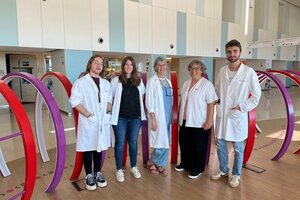Research in Pitt-Hopkins at Sant Joan de Déu, a neurodevelopmental disorder
Pitt-Hopkins syndrome is a rare genetic disorder, with an incidence of 1/11,000 to 1/41,000, caused by mutations in the TCF4 gene. This gene is crucial for the normal development of the nervous system. Children with Pitt-Hopkins exhibit significant developmental delay, severe intellectual disability, and communication difficulties; symptoms that they also share with patients with other mutated genes, such as Rett syndrome with mutations in the MECP2 gene.
In recent years, research at Sant Joan de Déu in the field of Rett syndrome and other neurodevelopmental disorders, such as Pitt-Hopkins, has made significant advances, thanks to the team led by Dr. Judith Armstrong, coordinator of the Genomics for the diagnosis of rare diseases group.
Her group has successfully integrated data from a multi-omic analysis (DNA, RNA, and protein) from fibroblasts of patients with Rett syndrome with a known mutation in MECP2, to characterize the molecular consequences of MECP2 dysfunction.
One of the major challenges to address is the search for biomarkers that can objectively assess the efficacy of treatments and clinical trials. However, thanks to the multi-omic analysis of patient fibroblast samples, the possibility of finding relevant biomarkers and therapeutic targets has opened up.
"The first thing we want to do is validate what we previously found in fibroblasts and see it in the brains of patients with Rett syndrome. And we would like to answer some questions like: does the profile we have characterized in patient fibroblasts resemble the profile that may be present in the brain? If there is a correlation between expression profiles, can it also be detected in blood (since it is the easiest tissue to access and, when performing an analysis, would greatly accelerate the prognosis and monitoring of the disease)? Can we compare the altered pathways already described for Rett syndrome, with other mutations detected in neurodevelopmental disorders, such as Pitt-Hopkins syndrome, which present the same symptomatology?" comments Dr. Judith Armstrong.
Delving into these similarities and differences could open new opportunities for the diagnosis and treatment of patients affected by these genetic conditions.
Research with a direct impact on patients
The research team will analyze 10 patients with each syndrome, including 10 patients with Pitt-Hopkins; a sample large enough to obtain significant results.
"In rare diseases, like Pitt-Hopkins syndrome, having a sample of 10 patients is very complicated, which is why we need the collaboration and involvement of all affected families. This sample bank of 10 patients will be one of the largest in the world for this syndrome. For this, we are immensely grateful to the families," explains Dr. Judith Armstrong.
From the study of the samples, the research team hopes that, in the short term, new technologies and diagnostic tools can be incorporated to improve the management of patients with aspects of neurodevelopmental disorders and thus improve the well-being of patients. This early diagnosis will allow for better clinical decisions in managing children.
In the medium term, gaining more detailed knowledge of the altered pathways and the pathophysiology of the disease will enable the development of much more targeted pharmacological approaches and open the doors for other scientists to successfully develop clinical trials.

This project will enable the creation of the largest sample bank of patients with Pitt-Hopkins syndrome.
